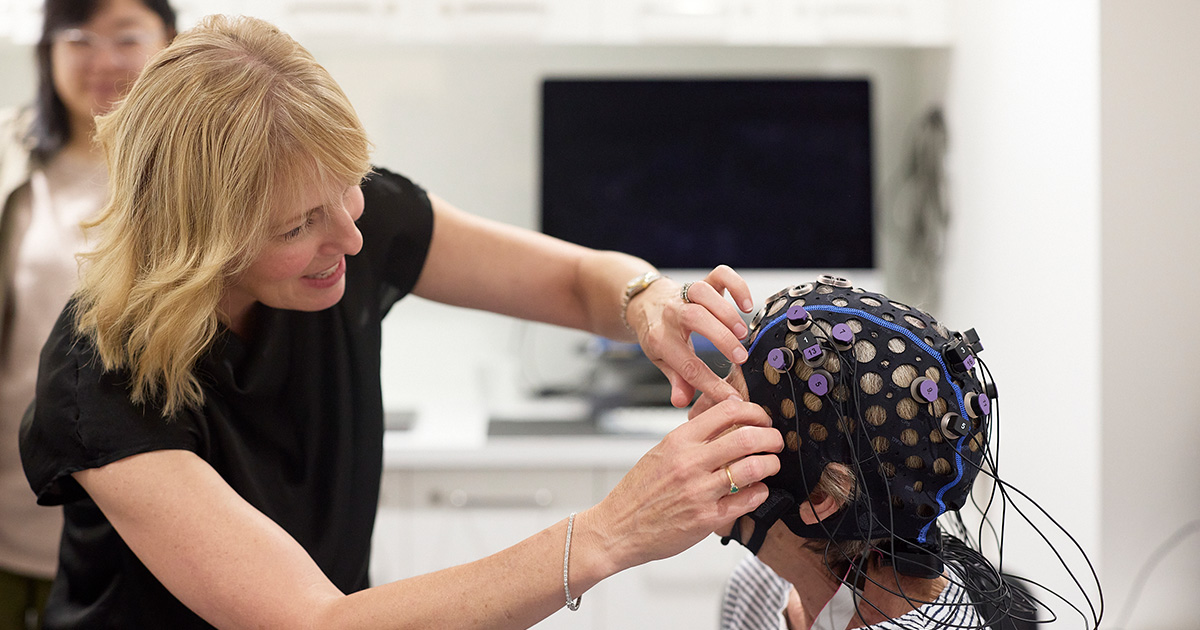The Woolcock Institute of Medical Research

CCDA: Where are we now?
The Woolcock’s Centre for Chronic Diseases of Ageing recently took stock of its achievements as it approaches its three-year anniversary in July.
The Centre, made possible because of the generous support of key donors, commenced in 2022 with a bold vision: to discover more about how chronic sleep and respiratory health conditions contribute to brain ageing and to identify and test new approaches for early diagnosis and treatment.
The multidisciplinary centre has brought together experts from sleep and chronobiology, lung physiology, respiratory technology, cell biology, clinical management, epidemiology, and data science – truly showing what can be achieved by a team of bright minds from diverse fields.
NEW APPROACHES
The Centre’s specialist research clinic underpins its work – it’s a clinic which provides comprehensive sleep, respiratory and brain health assessments with a pathway straight into key research studies such as the Oracle Study.
The Oracle Study is exploring early markers of cognitive impairment in people with obstructive sleep apnea (OSA); chronic obstructive pulmonary disease (COPD); and overlap syndrome – where patients have both OSA and COPD. The study has assessed 70 older adults to date and is ongoing.
Multiple clinical trials are also ongoing and are progressing quickly due to the generous support and commitment of research volunteers who give their time to participate.
The NeuroDORA study is investigating whether the approved insomnia treatment, Lemborexant, can help protect the brain and cognitive processes in older people who have difficulty sleeping through the night.
The Neuromodulation study uses new specialised brain stimulation technology to see whether painless electrical currents delivered to specific brain regions during deep sleep can improve memory and thinking.
And shortly, the Inhaled Melatonin study will commence. It will test whether a novel formulation of melatonin delivered to the lungs is more effective than oral tablets to improve sleep and reduce brain inflammatory markers.
Want to stay up to date with our research on sleep and respiratory conditions?
Sign up to our quarterly newsletter
NEXT-GEN RESEARCHERS
Not only is the Centre focused on new discoveries to slow brain ageing in chronic disease populations, it’s also educating and training the next generation of Neuropsychologists.
Through a formal partnership with Macquarie Health, over the next few months Neuropsychology Masters students are getting real-word, hands on experience at the Woolcock Institute through clinical placement – attending research visits and conducting cognitive tests. The collaboration will help to build clinical capacity and support the sustainability of the specialist research clinic into the future.
“When I take a step back and look at what we have achieved together, it’s quite outstanding” says Centre Director Associate Professor Angela D’Rozario. “I’m very proud of the team. They are highly dedicated to the research, but they also ensure that each and every research participant has a positive experience.”
PROGRESS THROUGH PARTNERSHIP AND INNOVATION
Recent participant, Snez, summarised her feelings about participating in the Oracle study in email feedback to the team. “I signed up to participate as I strongly believe in what you are your team are trying to achieve” she said. “I wish this was happening 20 years ago and maybe dementia wouldn’t have stolen my mother from me at 59…I’m more than happy to partake in any research that may help unravel this awful illness or any illness” she commented.
Asked what the Centre will achieve into the future, Centre Director Angela D’Rozario reflected: “We know that people with chronic sleep and respiratory diseases face a lot of challenges as they age” she said. “We are confident that the Centre’s new discoveries and innovations will improve the quality of life of older Australians – we very much look forward to seeing this happen”.










